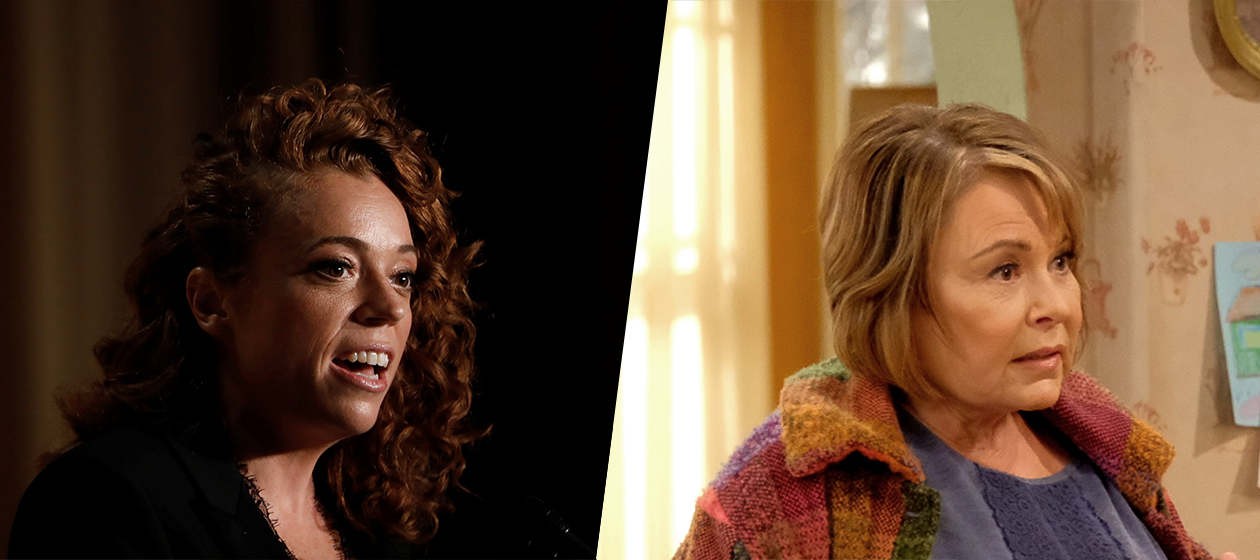Why political comedians will always let you down
As comics quickly note whenever they're called out for crossing a line: Their job is to be funny, not to be righteous


A free daily email with the biggest news stories of the day – and the best features from TheWeek.com
You are now subscribed
Your newsletter sign-up was successful
They say politics makes strange bedfellows, but these days, showbiz fandom may make 'em even stranger. Last week, the same activist hip-hop fans who were thrilled 10 years ago when Kanye West delivered an ad-libbed slam of President George W. Bush at a Katrina benefit were mortified when the rapper used his Twitter feed to signal-boost prominent Donald Trump defenders. A few days later, the same conservative politicians and pundits who've drafted off our current president's reputation for non-PC bluntness — while mocking oversensitive liberal "snowflakes" — made a public show of being offended by comedian Michelle Wolf's scathing anti-Trump monologue at the annual White House Correspondents' Dinner.
Being a fan — or a hater — has always been largely performative. We publicly declare our tastes and ideals whenever we tell the world our likes and dislikes. Still, if the last week has proved anything, it's that celebrities and entertainers don't always cooperate with what we think we know about them ... or about ourselves. This is especially true of comedians.
Take outspoken Trump supporter Roseanne Barr. ABC's revival of the '90s sitcom smash Roseanne has been a bigger hit than anyone could've expected, leading the president to claim the ratings victory as his own. But ironically, when the new Roseanne was first announced, some of the people happiest about the return were left-leaning telephiles, with fond memories of how Barr's original show brought an anti-authoritarian, live-and-let-live take on working-class life to the small screen. And for those willing to look past Barr's pro-Trump conspiracy-mongering, the revival has mostly maintained that underdog flippancy, blue-collar anxiety, and deep humanity that defines what Roseanne is. Nevertheless, some longtime Roseanne fans have been wondering what monkey's paw they wished upon, to end up with a situation where the massive popularity of a sitcom they love is being trumpeted as validation for a political leader they detest.
The Week
Escape your echo chamber. Get the facts behind the news, plus analysis from multiple perspectives.

Sign up for The Week's Free Newsletters
From our morning news briefing to a weekly Good News Newsletter, get the best of The Week delivered directly to your inbox.
From our morning news briefing to a weekly Good News Newsletter, get the best of The Week delivered directly to your inbox.
To those wringing their hands over this, all I can say is that your main mistake was in expecting Barr — or any comedian — to be an articulate, consistent champion of any of your sociopolitical causes. As comics quickly note whenever they're called out for crossing a line: Their job is to be funny, not to be righteous.
Of course that doesn't make it any less disappointing when Louis C.K. goes from being a bracingly honest visionary — renowned for helping female comedians — to being exposed as an exploitative creep who's confessed to pleasuring himself in front of women, without their consent. And it's hardly easy these days to be a vocal fan of Ricky Gervais' brilliant British sitcoms The Office and Extras, given that he's spent much of the past half-decade making cringe-inducing, self-aggrandizing comments about his atheism, or about how much he hates political correctness.
Or what about Amy Schumer and Tina Fey? Both have been held up as feminist role models, and both have been pilloried for racially insensitive jokes, in Schumer's stand-up act and Fey's sitcom Unbreakable Kimmy Schmidt. Dave Chapelle and Chris Rock? Both have "spoken truth to power" about race relations in America. But Chapelle's been less enlightened when it comes to making jokes about sexual harassment and transgender issues, and in Rock's recent standup, he argues that kids should be bullied. And that's not even taking into account Rock's own dicey history with women, or the debate over the mixed messages in Schumer's new body-image comedy I Feel Pretty.
Why is it that the most seemingly prophetic and vital comedians keep letting so many of their fans down?
A free daily email with the biggest news stories of the day – and the best features from TheWeek.com
Here are two theories:
1. Every comedian's schtick, regardless of its political content, gets stale through overexposure. In Louis C.K.'s case, even before he was shamed into exile (for now, anyway), many of the elements that made his award-winning FX show Louie so exciting had become more stock: from his aggressively elliptical "well, that's life" storytelling, to his attraction to characters whose worst traits were either shrugged off or actively applauded as mere "honesty."
2. Comedians — even the political ones — aren't wonks. The extent to which they engage with the finer points of public policy debates is generally only for the purposes of finding something to make fun of. Many comics cast themselves as "just like us" — confused and conflicted, and inclined to paint everything that's not "common sense" as ridiculous.
That "anything for a laugh" ethos is comedy's biggest bug — and feature. Let me be clear: I'm not arguing that comedians have to change what they're doing, to keep up with the times. All artists should feel free to explore the taboo, and to speak their minds. It's what keeps our culture vibrant and vital.
But fans of those artists should maybe take a beat before putting them on a pedestal. Take a joke for what it is: a joke. A funny remark can have the ring of truth, without being wholly truthful. The downside to comedians following their muses and letting their instincts guide them to an idea that gets a laugh is that they often don't see the point of checking themselves if there's legitimate pushback.
This kind of selective reading isn't that uncommon among TV's political comics. Samantha Bee, John Oliver, Seth Meters, Stephen Colbert, Saturday Night Live's "Weekend Update" anchors ... all of these folks are frequently very funny, and bring to light the failures of of our modern institutions. But they don't always get everything right. Given minutes or sometimes seconds to make a point, they lack the time — or perhaps the inclination — to go after the opposing side's best argument.
During the craziness of the 2016 presidential campaign, some fans of retired Daily Show host Jon Stewart lamented that he wasn't still around to go after Trump. But would he have been the right man for the job? Early in the election cycle, he blasted Hillary Clinton in an interview, saying he didn't know what she stood for. He claimed to know nothing about the convictions of a candidate who'd spoken at length about her proposals on the campaign trail, and posted them in full on her website.
Again: Stewart's a very funny comedian, who's done laudable work in the past on illuminating the absurdities of politics and media — and likely will again. But as he himself has said, at the end of the day he's here to entertain, not to be his viewers' primary source for information. And he frequently backs that up by proving he hasn't done the research.
Stewart's whole act is based on him knowing a lot about the news. Why should we expect better of Roseanne Barr, Amy Schumer, or Louis C.K.?
How much do you want to bet that before the year's out, Kanye West will pull some stunt that will remind conservatives why they used to loathe him, and Michelle Wolf will make some wisecrack that left-wing concern-trolls will consider "problematic?" Even the comedy star of the moment, Tiffany Haddish is so delightfully unguarded in interviews that it's probably only a matter of time before she says something that makes a lot of people mad.
I'm not saying that these stars don't deserve to catch flack, or even that it's wrong for former followers to wash their hands of them forever. We have a lot of entertainment options, and nobody's obligated to stay loyal to a celebrity who makes them uncomfortable. Artist should be free to express themselves, and audiences should feel free to reject them. That's what the marketplace of ideas is all about.
But we should definitely tap the brakes before we rely on any comedian to be our savior. After all, if we don't put our faith in entertainers to lift us up, they can't possibly let us down.
Noel Murray is a freelance writer, living in Arkansas with his wife and two kids. He was one of the co-founders of the late, lamented movie/culture website The Dissolve, and his articles about film, TV, music, and comics currently appear regularly in The A.V. Club, Rolling Stone, Vulture, The Los Angeles Times, and The New York Times.
-
 Switzerland could vote to cap its population
Switzerland could vote to cap its populationUnder the Radar Swiss People’s Party proposes referendum on radical anti-immigration measure to limit residents to 10 million
-
 Political cartoons for February 15
Political cartoons for February 15Cartoons Sunday's political cartoons include political ventriloquism, Europe in the middle, and more
-
 The broken water companies failing England and Wales
The broken water companies failing England and WalesExplainer With rising bills, deteriorating river health and a lack of investment, regulators face an uphill battle to stabilise the industry
-
 The billionaires’ wealth tax: a catastrophe for California?
The billionaires’ wealth tax: a catastrophe for California?Talking Point Peter Thiel and Larry Page preparing to change state residency
-
 Bari Weiss’ ‘60 Minutes’ scandal is about more than one report
Bari Weiss’ ‘60 Minutes’ scandal is about more than one reportIN THE SPOTLIGHT By blocking an approved segment on a controversial prison holding US deportees in El Salvador, the editor-in-chief of CBS News has become the main story
-
 Has Zohran Mamdani shown the Democrats how to win again?
Has Zohran Mamdani shown the Democrats how to win again?Today’s Big Question New York City mayoral election touted as victory for left-wing populists but moderate centrist wins elsewhere present more complex path for Democratic Party
-
 Millions turn out for anti-Trump ‘No Kings’ rallies
Millions turn out for anti-Trump ‘No Kings’ ralliesSpeed Read An estimated 7 million people participated, 2 million more than at the first ‘No Kings’ protest in June
-
 Ghislaine Maxwell: angling for a Trump pardon
Ghislaine Maxwell: angling for a Trump pardonTalking Point Convicted sex trafficker's testimony could shed new light on president's links to Jeffrey Epstein
-
 The last words and final moments of 40 presidents
The last words and final moments of 40 presidentsThe Explainer Some are eloquent quotes worthy of the holders of the highest office in the nation, and others... aren't
-
 The JFK files: the truth at last?
The JFK files: the truth at last?In The Spotlight More than 64,000 previously classified documents relating the 1963 assassination of John F. Kennedy have been released by the Trump administration
-
 'Seriously, not literally': how should the world take Donald Trump?
'Seriously, not literally': how should the world take Donald Trump?Today's big question White House rhetoric and reality look likely to become increasingly blurred
